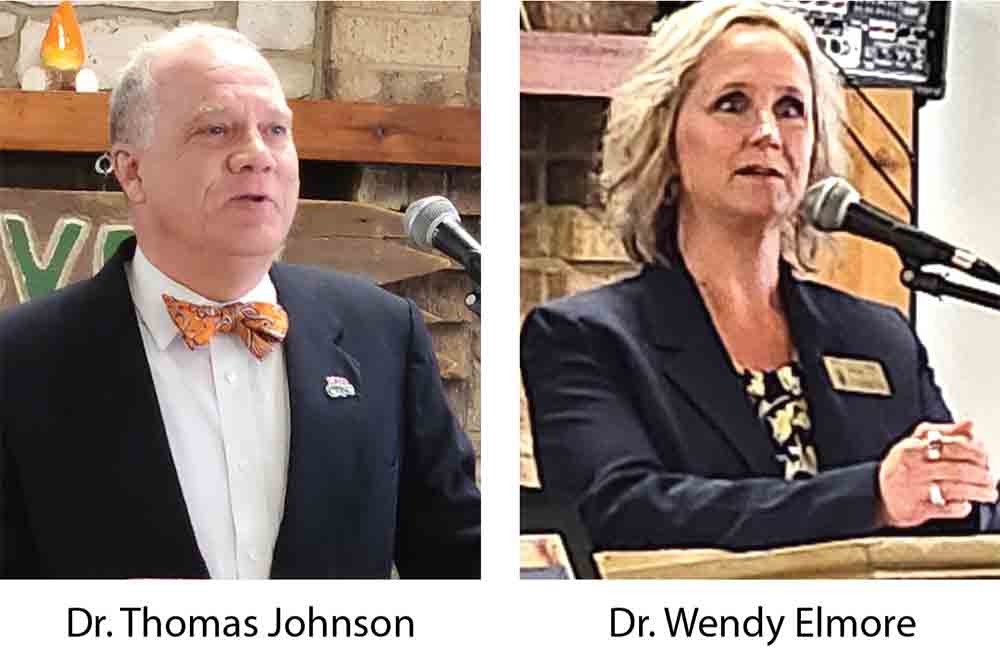Educational, workforce opportunities coming

By Emily Banks Wooten
This email address is being protected from spambots. You need JavaScript enabled to view it.
Dr. Thomas Johnson and Dr. Wendy Elmore, president of Lamar State College-Orange (LSC-O) and provost and executive vice president, respectively, were the guest speakers for the recent quarterly membership meeting of the Livingston-Polk County Chamber of Commerce.
They began their presentation with a brief video highlighting LSC-O’s mission of transforming lives and communities and being the place where hope meets opportunity.
“Once the opportunity came up to be able to serve the Polk County Education Center, I contacted our sister colleges – Lamar State College-Port Arthur (LSC-PA) and Lamar Institute of Technology (LIT) and said we have an opportunity to help a lot of people that are important to me, and they were excited about it. They were more than happy to meet that need,” Johnson said.
“Because we do so many things differently, in addition to the things we do the same, it just provides more opportunities,” he said.
The three two-year Lamar schools and the four-year Lamar University are all a part of the Texas State University System (TSUS). Founded in 1911, TSUS is the first higher education system established in Texas. Created to consolidate the support and management of state teacher colleges, the system has evolved into a network of higher education institutions stretching from the Texas-Louisiana border to the Big Bend region of west Texas.
TSUS has seven flagship institutions, located on 15 campuses, which have access to the same quality and level of support from the system administration. Those seven institutions are academically, culturally and geographically diverse, yet offer a broad range of academic and career opportunities. In addition to the four Lamar schools, the other three institutions that comprise TSUS are Sam Houston State University, Sul Ross State University and Texas State University.
“We’re able to synergize all of the schools in the system to provide more opportunities for Polk County, not just two-year degrees, but four-year degrees too. We’re trying to build it up to work with our sister universities, focusing more on certificates that lead to a bachelor’s degree.”
Johnson said that LSC-O caters to “a first-generation kid that just wants a better life. If you’ve got the want to, we’ll make it happen,” he said, adding that 70% of their students are first-generation students.
Retired from Houston Police Department, Johnson said “this education gig” is actually his second career. Be that as it may, he is extremely passionate about it and that passion comes through in spades. And being a first-generation student himself, he knows what he speaks.
He tells the story of going to an orientation at a prestigious private school and being told, “Look to your left and look to your right. Only one of you will be here for graduation.” Not comfortable with that, he left that school and went elsewhere. At LSC-O, he has reimagined that exercise and exuberantly tells his students, “Look to your left and look to your right and we’ll see you all three on graduation night.”
Elmore also expressed her enthusiasm about the opportunity to have a presence in Polk County.
“Coming into the Polk County Education Center with us are two other colleges – Lamar State College-PA and Lamar Institute of Technology. That’s important because together we can provide a wider array of programs. There are so many more opportunities than just one of us can do,” Elmore said.
“Our goal is very aggressive, and we are hoping to be here in the next few months in a unified fashion and with great excitement. We have some positions that are open that we need to fill. One is the executive director which is a fulltime position, and we want someone who will share our passion for Polk County,” Elmore said.
“We are here to do what you need and what you want. All three two-year colleges serve populations that are rural. With our first-generation students, we strategically try to make them feel comfortable. Another thing that is very important to us is them graduating with a certificate or a degree. We want them to have a career, not just a job but a career,” Elmore said.
“We’re making significant strides in our graduation rates. Last year we graduated 763, a 20% increase over the previous year,” she said, noting that the average age of the students is 28. “We have a large population of dual credit students and working with (LISD Superintendent) Dr. Hawkins has been incredible. We are very anxious to be here. We want our students to be successful.”
The presence of LSC-O and its sister schools in Polk County will provide local students with career and workforce opportunities in addition to academic opportunities.
“It’s important to live in town, stay in town, work in town. It’s sad when you have to leave home because of the economics of it. I am devoted to skills, crafts and trades. People need opportunities for what they want to do,” Johnson said.
LSC-O continues to make strides under the leadership of Johnson and Elmore. It was ranked number two of 53 Texas public two-year colleges in percentage growth in academic and technical credit students for fall 2022 and was ranked number three in percentage growth in workforce and non-credit students for the same time period.
You are a guest
or post as a guest
Be the first to comment.

